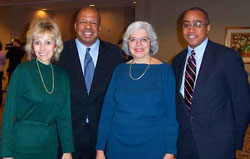|
|
 |
For Immediate Release
March 11, 2002 |
|
Contact: Ken Trepeta (202) 708-4287
Kimberly Brock (202) 414-0773
|

U.S. SENIORS COMMISSION CONCLUDES SERIES OF FIELD HEARINGS EXAMINING HOUSING & HEALTH CARE SERVICES FOR ELDERLY
Congressman Elijah Cummings, Noted Experts and Local Residents Offer
Testimony for Report Due June 2002
Baltimore, MD - The U.S. Commission on Affordable Housing and Health Facility Needs for Seniors in the 21st Century ("the Seniors Commission") concluded its national series of field hearings in Baltimore today. Held at Charlestown (an Erickson Retirement Community), the open forum examined the current status of the cost and availability of housing and health services available to seniors, specifically those in the Mid-Atlantic region.
The day-long session included a morning facility tour (9:15AM), followed by the field hearing including testimony from policy makers, housing and healthcare services advocates, and Erickson residents. Participating witnesses included:
- Congressman Elijah Cummings (D-MD)
- Patrick Brady, Executive Director, Citizens for Long Term Care
- Earl Armiger, Vice Chair, Senior Housing Council, National Association of Homebuilders
- Sue Harris-Green, Deputy Director for Multifamily Housing Processing Division, Rural Housing Service
- Phil Carroll, President, National Affordable Housing Management Association
- Dr. David Schwartz, President and CEO, Elder Care Companies
- Jeff Kincheloe, Deputy Director for Government Affairs, National Association for Homecare
"Every American deserves affordable healthcare and housing in their senior years," stated Representative Cummings. "We all have a compelling interest in the important work of this national commission."
In addition to witness testimony, the field hearing was open to the public and included an open forum session in which concerned citizens could speak directly to the commissioners. A unique segment featuring the challenges faced by middle-income senior citizens was also introduced at the event.
"As the population grows, the finite resources dedicated to addressing the needs of seniors will become strained. That is why this Commission is looking to get more out of what we have now and find ways that meet those needs more efficiently and effectively," stated Commission Co-Chair Nancy Hooks. "The Seniors Commission is identifying the policies that have worked and those that have failed in providing housing and services to the elderly over time. But, perhaps most importantly, we are considering alternative approaches to effectively address the future."
Currently, more than 35 million Americans are 65 years or older, representing about one in every eight Americans. However, the senior population is expected to dramatically increase to 70 million in the next 20 years as members of the "Baby Boom" generation reach 65. According to the Maryland Department of Aging, of the 5.3 million people in Maryland in 2000, 15 % (801,036) were over the age of 60. The percentage is expected to increase to 23% of Maryland's projected population of six million by the year 2030. 60% of the Maryland's elderly reside in Anne Arundel, Baltimore, Montgomery and Prince George's Counties and Baltimore City. In 1990, 65,648 older Marylanders lived in poverty as defined by the federal poverty guidelines published in 1989.
"We are facing an unprecedented increase in our seniors population, and unless we are act now America will not be prepared with adequate housing and healthcare services for the aging," stated Ellen Feingold, Commission Co-Chair. "With the completion of our series of field hearings and with the invaluable knowledge gained by the testimonies shared with us, we will move forward with our role to suggest recommendations on how Congress can best serve their older constituents."
The Seniors Commission was created by an act of Congress to study and report back to the U.S. House of Representatives and the U.S. Senate on the housing and health needs for the next generation of older Americans. The Commission is empowered to offer specific policy and legislative recommendations to increase affordable housing options and improve health-related services for seniors now and as the Baby Boom generation reaches retirement age. Existing and commissioned research along with expert and public testimony compiled at various field hearings across the U.S. will be used to compile the report. The Seniors Commission will issue its recommendations to Capitol Hill and the White House by June 30, 2002.
|
 |
